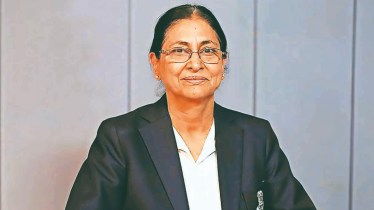Meeran Chadha Borwankar, an IPS officer of the 1981 batch, was the first woman to become a district police chief in Maharashtra, and then a police commissioner as well. Having retired as Director General of the Bureau of Police Research and Development, and Director General of the National Crime Records Bureau, Borwankar wrote two books about her time in the police services—Leaves of Life (2017) and Madam Commissioner: The Extraordinary Life of an Indian Police Chief (2023). At the second edition of the Crime Literature Festival of India, Borwankar talks with Garima Sadhwani about her journey. Edited excerpts:
Tell us about the challenges you faced as a woman IPS officer.
When I joined in 1981, I was the only woman in my batch. I was made to feel unwelcome by my batchmates in the National Police Academy. Every day the message sent to me by their actions was that this is no place for a woman.
Even when I joined the Maharashtra cadre, I saw a certain discomfort in my colleagues. It wasn’t resentment; it was the fact that they didn’t know what to do with a woman in the force. Slowly, when they saw my work with the community and within the police force, they started to realise that my identity was not of a woman officer, it was simply that of an officer. That’s when they started taking me seriously.
I, too, had my doubts about whether I would be able to deal with any violent instances of public disorder. My journey had some apprehensions and some misgivings on my part, but majorly there was a cultural negativity towards the “requirement of women officers” in the force. Acceptance for me took a long time. But over the years, not only was I accepted, my work was celebrated too.
As a woman who has been in the topmost positions in the police services, how do you perceive the increasing crimes against women in India?
What we have to see is whether crimes against women are increasing, or whether more women are now reporting the crimes that they’re victims of. Times are changing and now more and more women are confidently reporting crimes, rejecting the idea that it might be a stigma that they have to live with. More women registering complaints is actually a welcome change, showing that they are actively seeking justice for themselves.
But a lot of our law enforcement agencies are dismissive of women, queer folks, or any marginalised person who might want to register a complaint. Is anything being done to challenge and change this?
We have been trying to address this for over two decades now. We have involved academic institutions to help us as well. When I was serving in Mumbai, we collaborated with the Tata Institute of Social Sciences, and with the Nirmala Niketan College of Social Work very actively. But since we are a male-dominated force, it is an unfortunate fact that we are still not as receptive to women’s complaints.
Recently, an IT engineer from Pune approached me after a police officer didn’t register her complaint against her husband, who she alleged was violent. The officer made her wait, and then her complaint was watered down and minimised. I felt very sad that even after sensitising training with our officers, we have not been able to make much of a dent and I had to intervene to get a simple complaint registered.
We need a cultural change in the police department, which might come with the help of public participation.
Since we’re at a festival where crime fiction is being discussed, tell us about the impact of violence against women being glorified in pop culture.
Glorifying stalking and showing that it’s ‘macho’ to reject anyone’s consent, cultural messages like this do impact young boys. But slowly the media is also understanding this, and changing the way they portray crime in pop culture.
For instance, I’ve written about the criminal justice system, about how the police, forensics, and the prison systems operate, what the judiciary does, and gone into depth about human trafficking as well.
The substance is from my service, but my idea was to make the reader aware, and give them more information about these systems than they would usually get from any other form of media.
